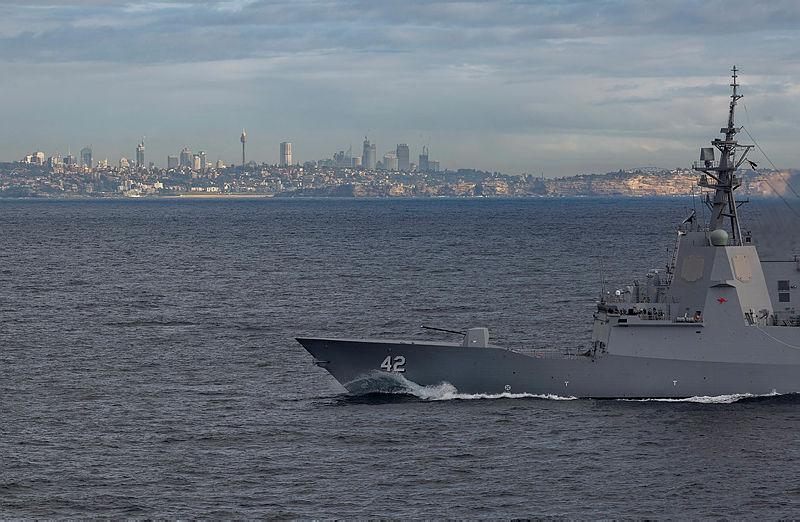
Sea state
The Royal Australian Navy has unveiled the last of its three Hobart-class guided missile destroyers, HMAS Sydney. The other two ships in the series are HMAS Hobart and HMAS Brisbane, and all three feature the Aegis combat system. The new vessel is the fifth ship to bear the Sydney name; three earlier ships were decommissioned and one, HMAS Sydney (II), was sunk by the German auxiliary cruiser Kormoran during World War II.
The US Navy has completed a test of a powerful laser designed to take out enemy aircraft. Videos of the demonstrations show what’s known as a solid-state laser being fired from USS Portland and shooting down a drone mid-air. The US Navy has claimed that lasers will help it redefine naval warfare, with hopes that the technology may be effective in defending against targets ranging from drones and small boats to long-range missiles.
Flight path
Lockheed Martin will miss this year’s delivery targets for F-35 fighters due to global supply chain disruptions resulting from the Covid-19 pandemic. The delay, which was announced days after President Donald Trump suggested moving more of the jet’s production to the US, will affect a number of countries, likely including Australia, which was due to accept 15 new F-35s next year.
The US has announced its intention to withdraw from the 2002 Treaty on Open Skies, which allows its 35 signatories to conduct unarmed surveillance flights over other participant countries. The US State Department says the treaty has ‘been twisted and perverted in its implementation and now serves Russian purposes inimical to [international] security’. Russia has dismissed these claims and says it will uphold the treaty. Arms-control experts have raised concerns about the US withdrawal, arguing that the treaty has aided transparency and stability.
Rapid fire
Chinese Premier Li Keqiang says Covid-19 will not affect the 2020 budget of the People’s Liberation Army. Defence spending will grow by 6.6% on the prior year, a smaller increase than previously forecast, but still significant, especially in light of an expected contraction of the broader economy. Despite a lack of transparency from the Chinese government on funding allocations, experts say that the budget will be spent mainly in two areas—conventional warfare and non-conventional threats such as terrorism. Other items slated to receive defence funding are humanitarian assistance, epidemic prevention, and new equipment, improved training and pay rises for personnel.
A new US government report has found that women still account for less than 17% of all active military personnel. The army scored second lowest for number of women, at 15.1%, and the Marine Corps was lowest at 8.6%. The study found that the promotion rate for female officers was around 5 percentage points higher than for male officers. However, the proportion of enlisted men receiving promotions was higher than for their female counterparts. Women are more likely than men to leave the military before retirement, which makes it less likely that they’ll reach leadership roles. Family issues and sexual assault were the main reasons women gave for dropping out. The report recommends that the military focus on women’s retention as well as recruitment.
Final frontier
A KPMG report has identified significant opportunities and challenges for the Australian space industry. The report contains insights from 30 experts and leaders in the field and makes 30 predictions for 2030, including that every business across all industries will benefit from space enterprises and that manufacturing in space will be real and viable. Australia has a strong and growing $5 billion space sector that is bolstered by the Australian civil space strategy.
Japan has launched a new space defence unit, the ‘Space Operations Squadron’. It will be part of the Japan Air Self-Defense Force and its primary role will be to protect Japanese satellites from adversarial threats and space debris. Based in Tokyo, the unit will cooperate and train with the US Space Command and the Japan Aerospace Exploration Agency. Japanese Defence Minister Taro Kono says the group should be fully operational by 2023 and aims to launch its first satellite by 2026.
Wired watchtower
Pressure from backbench MPs has forced the UK government to conduct a new review into 5G, paving the way for a reduction in the presence of Huawei technology in the country’s 5G network to zero by 2023. The original plan was to cap the Chinese-owned company’s involvement at a 35% market share. However, sentiment against the Chinese government has hardened amid the Covid-19 pandemic and, along with the threat of US sanctions, led to a change in the UK’s position. This has been coupled with more discussion in the UK about reducing the country’s economic dependence on China.
The federal opposition has raised concerns about a lack of accountability from Australian government entities that repeatedly perform poorly on cybersecurity resilience audits. The Australian National Audit Office has found low levels of compliance with cybersecurity standards among certain agencies and departments, despite internal assessments indicating otherwise. Shadow assistant cybersecurity minister Tim Watts is calling for changes to reporting requirements and increased transparency as a way to create better outcomes.